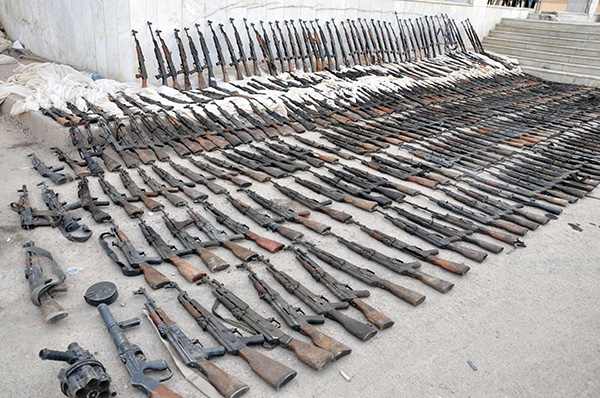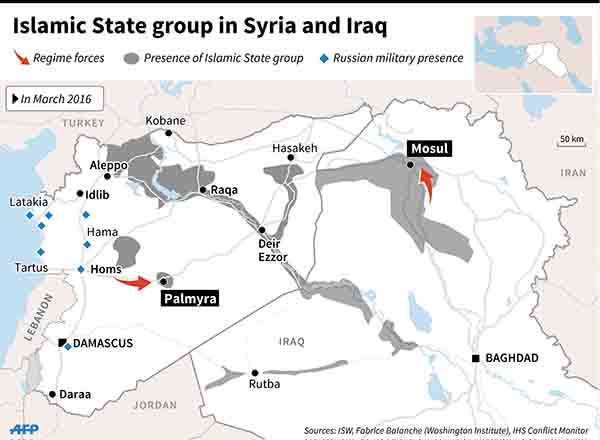
A report by the Conflict Armament Research group said that overall more than 50 companies, in over 20 countries, produced or distributed goods that ISIS forces subsequently used to make IEDs, drones and improvised weapon systems.
ISIS extremists were able to build up a major arsenal of explosives, weapons and drones through a sophisticated procurement process that saw “red flags” ignored by governments and suppliers, a monitoring group said on Tuesday.
The Conflict Armament Research group said in a just-released study that ISIS was able to build up a store of material for a weapons production programme in Iraq and Syria from 2015-2019 via individuals and companies in southern Turkey and elsewhere.
ISIS was ousted last year from its former strongholds in Iraq and Syria — where it had wanted to build a so-called caliphate — but experts warned that the knowhow and connections in its supply network have not gone away.
ISIS “procured key commodities through groups of linked, family-owned companies and individuals located near key border crossings into ISIS-held territory,” CAR said, adding these groups were centred around the towns of Siverek and Akcakale in southern Turkey.
It said its investigations indicated that the supply chains for a range of commodities procured by ISIS forces “involved the same individuals and businesses, primarily based in the Turkish border town of Akcakale and the nearby city of Sanlıurfa.”
The report points to intense activity on Turkish territory that should have been quite difficult for Ankara to miss.
Through triangulating commercial documentation and interviews with suppliers, CAR confirmed that “a single family in Sanlıurfa, Turkey, was one such junction point. This family was the purchaser or consignee of aluminium paste, UAV components, and surveillance equipment.”
A recovered ISIS document also showed that the extremist group’s operatives “coordinated with established cross-border smugglers, who paid local Turkish officials to allow the passage of goods across the Akcakale border gate.”
But the CAR emphasised it has no evidence that the companies involved were “witting accomplices” to ISIS procurement efforts or guilty of any wrongdoing.
“They nonetheless acted as key junction points within the supply chains that provisioned ISIS forces,” it said.
It said that purchases of bulk explosive precursors and electronic items through this network had unusual features that should have raised “red flags.”
Companies made large purchases of products that were “incongruent” with their business activities, it said, pointing to how a small mobile phone shop purchased six tonnes of aluminium paste from a large chemical distributor.
– Lingering threat–
Mike Lewis, co-author of the report, said the findings show how “surprisingly fragile” the procurement network was, relying on a small number of key individuals and businesses.
“With stronger due diligence, much of this trade might have been disrupted,” he said.
Namir Shabibi, CAR’s Head of Iraq Operations, warned that although ISIS forces may no longer hold territory, remaining cells have become increasingly active in the past year.
“Preventing their procurement efforts by spotting the kinds of red flags detailed in this report remains important for countering the group’s resurgence,” he said.
The report said that overall more than 50 companies, in over 20 countries, produced or distributed goods that ISIS forces subsequently used to make IEDs, drones and improvised weapon systems.
As well as Syria and Turkey, countries from where materials were obtained included Britain, Denmark and Spain.
“Goods moved remarkably rapidly though ISIS forces’ supply chains,” the report commented.
The report also said that from at least 2015, ISIS technicians also sought to build sophisticated drones powered by “pulsejet” engines by purchasing technical plans.
Sam Heller, an independent analyst and advisor to the International Crisis Group (ICG), said a video posted by ISIS at the end of last year showing its equipment indicated it had access to relatively few resources.
“So much of it seems inexpensive and relatively easily available which is key to the sustainability of the type of insurgency,” he said.
A prominent Twitter commentator on weapons, who goes by the name of Calibre Obscura (@CalibreObscura), told AFP that despite the losses sustained by ISIS, “knowledge will not have been lost, it will be retained.”
If ISIS is in a position to use the procurement system again, “it will be much easier for them to restart that,” said the commentator.
ISIS forces’ procurers also sought goods and intangible knowledge to develop new, ambitious improvised weapon systems. Their efforts included purchasing technical plans for a pulsejet engine with the intention of developing large, high-speed UAVs; and contracting suppliers for an automated anti-aircraft system.

Through triangulating commercial documentation and interviews with suppliers, CAR confirmed that “a single family in Sanlıurfa, Turkey, was one such junction point. This family was the purchaser or consignee of aluminium paste, UAV components, and surveillance equipment.”
A recovered ISIS document showed that the extremist group’s operatives “coordinated with established cross-border smugglers, who paid local Turkish officials to allow the passage of goods across the AkCakale border gate.”
CAR’s investigations indicated that the supply chains for a range of commodities procured by IS forces “involved the same individuals and businesses, primarily based in the Turkish border town of AkCakale and the nearby city of Sanlıurfa.”
